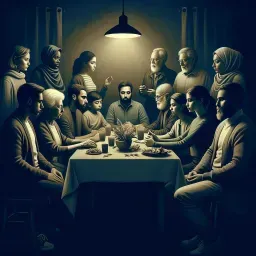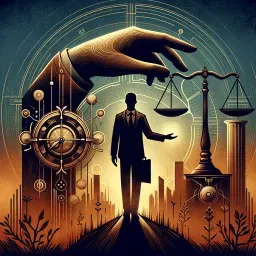”You talk about vengeance.
Is vengeance going to bring your son back to you?“

0
0
0
0
- Meaning
- The phrase underscores a profound philosophical inquiry into the nature of grief and revenge. It questions the validity of vengeance as a way to cope with the death of a loved one. The underlying philosophical concepts include existentialism, which contemplates the absurdity of life and death, and Stoicism, advocating for inner peace despite external adversity. Psychologically, it addresses the aspect of healing, suggesting that seeking revenge only prolongs suffering rather than providing closure.
- Allegory
- The elements in this image reflect the essence of the phrase by juxtaposing the somber act of loss with the transformative beauty of acceptance and healing. The tranquil sunset signifies the end of a turbulent day, embodying hope and calm. The figure symbolizes a journey of self-reflection, moving away from thoughts of vengeance and towards remembrance, while the flowers represent love that endures beyond loss.
- Applicability
- In personal life, this phrase serves as a reminder to seek constructive ways of coping with loss instead of being consumed by the desire for retribution. It encourages individuals to focus on healing, remembrance, and perhaps engagement in positive actions that honor the memory of the lost, rather than being sidelined by bitterness and anger.
- Impact
- The phrase highlights a significant cultural conversation around themes of vengeance, grief, and healing. It has resonated in discussions about the consequences of revenge and has inspired similar dialogues in literature and counseling contexts, focusing on the importance of emotional recovery.
- Historical Context
- The context of the phrase arises from the early 2000s, particularly through its portrayal in popular media. The film 'Gladiator' was released in 2000, during a time when themes of heroism and the personal cost of revenge were prevalent in cinematic narratives.
- Criticisms
- Some critics argue that the pursuit of vengeance can serve as a powerful motivator, asserting that it provides a sense of justice or closure. However, counterarguments emphasize that vengeance ultimately leads to a cycle of violence and deeper anguish, suggesting that love and remembrance are more potent forms of honor.
- Variations
- Variations of this phrase exist across cultures emphasizing the destructive nature of vengeance, such as in Japanese culture where the concept of 'Wabi-Sabi' embraces accepting loss and finding beauty in imperfection rather than retaliating.
-

Women and children can be careless, but not men.
-

Don’t ever take sides with anyone against the family.
-

You ever heard the philosophy that once a man admits that he's wrong, he is immediately forgiven for all wrongdoings?
-

Heaven has no rage like love to hatred turned, nor hell a fury like a woman scorned.
-

I have a sentimental weakness for my children, and I spoil them, as you can see.
-

Never tell anybody outside the family what you’re thinking again.
-

This is a tasty burger!
-

You underestimate my power!
-

Some day, and that day may never come, I will call upon you to do a service for me.
-

Luca Brasi sleeps with the fishes.
-

This is the life we chose, the life we lead. And there is only one guarantee: none of us will see heaven.
No Comments